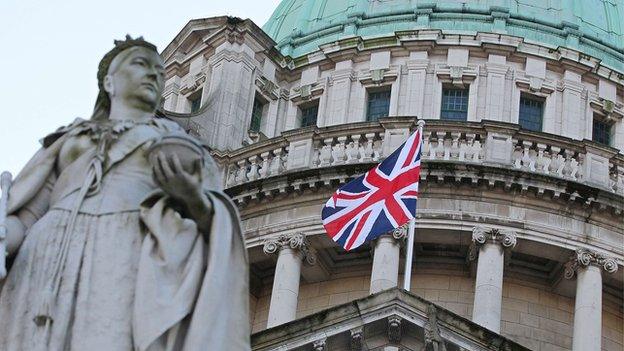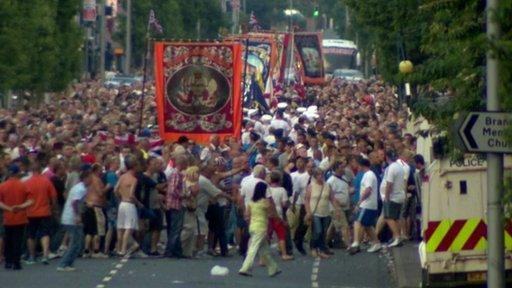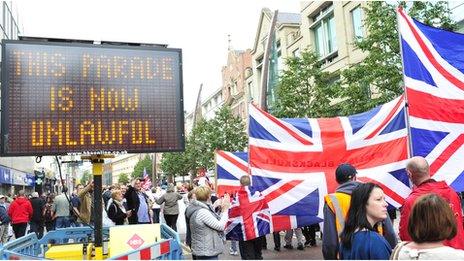Matt Baggott flag protest appeal has judgement reserved
- Published

A campaign of loyalist street protests took place following Belfast City Council's vote on flying the union flag
Judgement has been reserved in an appeal by PSNI Chief Constable Matt Baggott against a ruling that police wrongly facilitated flag protests.
In April, a High Court judge said police had not understood their powers over the loyalist protests.
In the Court of Appeal, lawyers for police argued that the findings were flawed and unfair.
A panel of senior judges will now consider all submissions before reaching a verdict.
The appeal had been fast-tracked due to its importance to how police deal with contentious parades over the summer marching season.
'Unjustified inertia'
In the previous ruling, the PSNI's handling of demonstrations was also found to have breached the human rights of a nationalist resident exposed to accompanying disorder.
The man, identified only as DB, who lives in the nationalist Short Strand area went to court over the PSNI's failure to provide assurances that it would prevent any future parade past his home.
The verdict was related to weekly processions from east Belfast into the city centre during December 2012 and January 2013.
A High Court judge described the policing operation at that time as being characterised by "unjustified enforcement inertia".
Demonstrations were staged in response to the decision to restrict the flying of the union flag at City Hall to designated days only. It had previously been flown all year round.
'Lives at risk'
In the three-day appeal hearing in Belfast, senior counsel for the PSNI argued that the findings were undermined by both the level of resources deployed to deal with protesters and the decision to bring charges against passive demonstrators.
He added that the police were fully aware they could stop the illegal union flag protest marches and that a decision had been made to block the earliest parade.
However, this decision was changed after intelligence indicated loyalist paramilitary involvement in violence associated with the protests could risk lives.
The court heard that part of the PSNI's case depended on previous rulings on how the force dealt with disorder during the Holy Cross Primary School dispute in north Belfast in 2001., external
Domestic and European courts endorsed the police's handling of that situation.
However a lawyer for DB said there were key differences between the two situations, and that the PSNI undermined the will of Parliament, when it brought in laws specifically to deal with marches.
She also challenged the assertion that police were ready to block the first parade, submitting that there was no evidence of any intelligence assessment around ensuing protests.
In reserving their judgement, the judges said they wanted "to reflect carefully on all the submissions".
- Published16 May 2014

- Published29 April 2014

- Published28 April 2014

- Published18 November 2013

- Published21 September 2013
